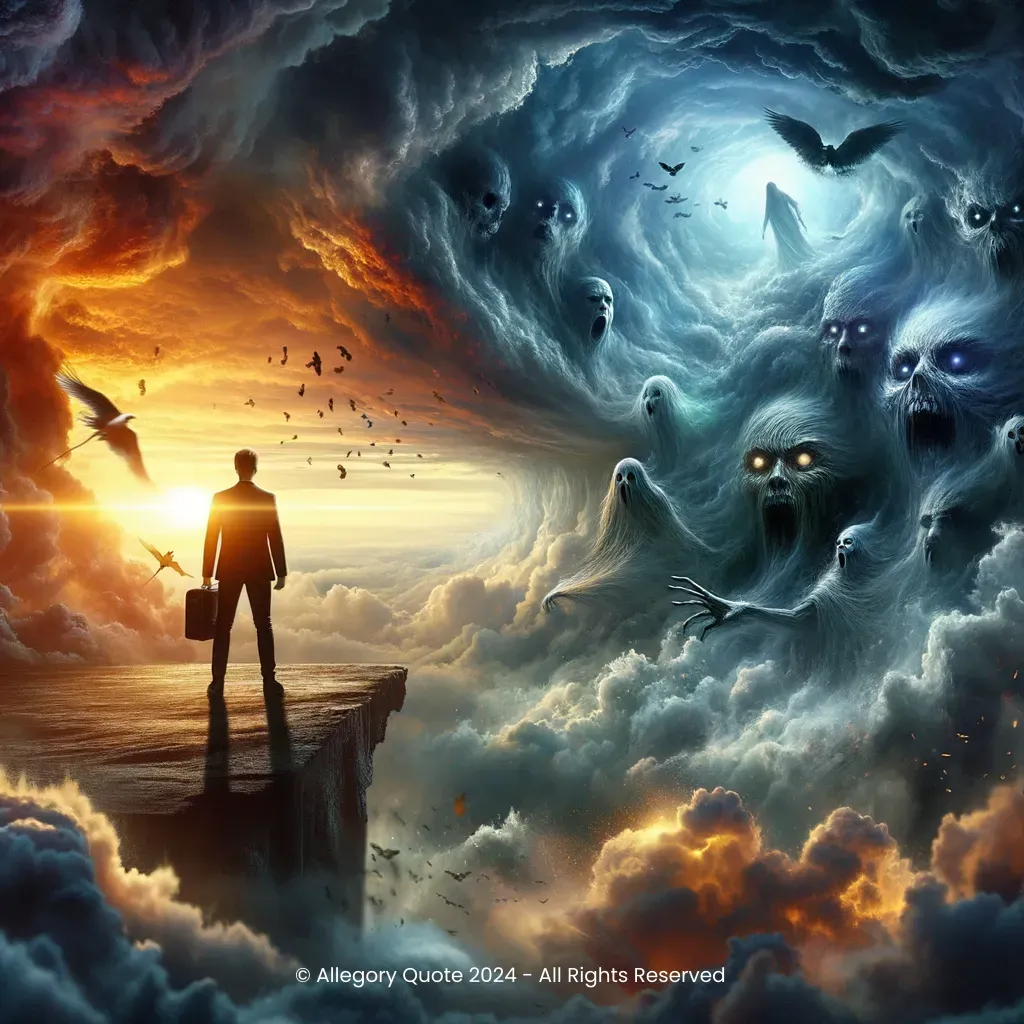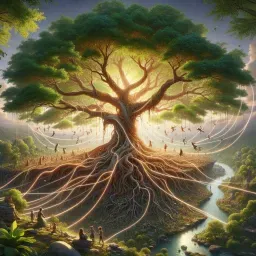”Courage is not the absence of fear,
but the triumph over it“

0
0
0
0
- Meaning
- This phrase highlights the essence of true bravery: it does not mean lacking fear but rather the ability to overcome it. Courage arises precisely when one feels fear but chooses to act despite it. This recognition of fear is crucial because it acknowledges our humanity. The triumph over fear showcases strength of character and the willingness to move forward in the face of adversity.
- Allegory
- The image includes several symbolic elements: the person at the edge of a cliff represents an individual facing a daunting challenge or fear. The stormy sky with its chaotic elements symbolizes the fears that we all encounter. The figure’s calm and strong demeanor signifies the inner strength and resolve to confront and overcome fear. The emerging sunrise in the background symbolizes hope, new beginnings, and the triumph of courage over fear. The contrasting colors between the storm and the sunlight highlight the transition from fear to hope, encapsulating the essence of the phrase.
- Applicability
- This phrase can be applied to everyday life in numerous ways. In personal endeavors, it encourages individuals to pursue their goals and aspirations despite their fears and anxieties. In professional settings, it's a reminder that taking calculated risks and facing challenges head-on is a part of growth and success. Lastly, it serves as a supportive message for those grappling with mental health issues, affirming that the presence of fear is natural and victory lies in overcoming it.
- Impact
- This phrase has had a substantial impact on global culture, reinforcing the idea of persevering in the face of fear and adversity. It has been widely quoted in motivational speeches, literature, and personal development contexts. Additionally, it has inspired numerous individuals and movements striving for justice, equity, and personal growth.
- Historical Context
- Nelson Mandela's association with this phrase places it in the context of his fight against apartheid in South Africa. This struggle was fraught with danger, oppression, and significant personal risk, making the concept of overcoming fear deeply relevant. The fight against apartheid was a powerful historical movement that required immense courage from Mandela and other activists.
- Criticisms
- Some criticisms of this phrase include the argument that it oversimplifies the concept of fear and courage. Critics might say it fails to acknowledge that some fears are based on very real and rational foundations. Additionally, the emphasis on 'triumph' can be seen as placing undue pressure on individuals to 'conquer' fear, which can sometimes be an unrealistic expectation depending on circumstances.
- Variations
- Variations of this phrase exist across different cultures, often emphasizing the virtue of bravery in the face of fear. For example, a Japanese proverb states, "Fear is only as deep as the mind allows." This underscores the psychological dimension of fear and the importance of mental resilience.
-

With great power comes great responsibility.
-

Wall Street.
-

Even the darkest night will end, and the sun will rise.
-

In any moment of decision, the best thing you can do is the right thing, the next best thing is the wrong thing, and the worst thing you can do is nothing.
-

If you tell the truth, you don't have to remember anything.
-

With friends like these, who needs enemies?
-

That which does not kill me makes me stronger.
-

I have not yet begun to fight!
-

We do not inherit the Earth from our ancestors; we borrow it from our children.
-

You are entitled to your own opinions, but not your own facts.
No Comments